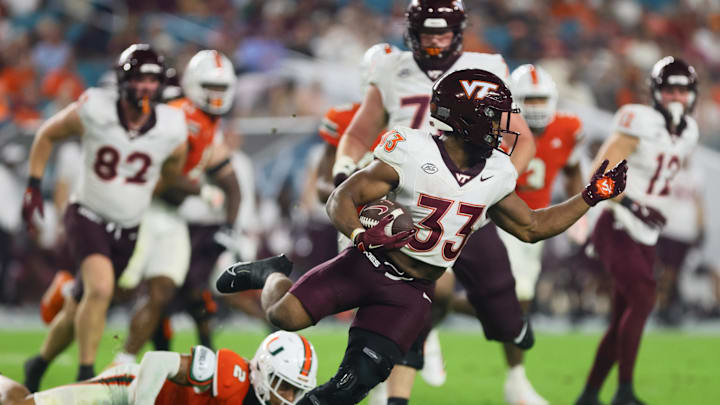Virginia Tech vs Stanford: Game Preview, Matchup Breakdown, and Final Score Prediction

Stanford (2-2, 1-1) is set to host Virginia Tech (2-3, 0-1) in the Cardinal’s first ever ACC home game.
The Cardinal has struggled at home in recent memory. Stanford has lost nine straight home games against FBS opponents. Their last home win however, was a stunning 15-14 win against Arizona State in 2022 where the Sun Devils were inches away from winning the game. Going back even further than that, Stanford has lost 15 of their last 16 home games against FBS opponents.
Despite this, Stanford has played pretty well in comparison to their preseason expectations. The Cardinal started off their season against TCU, followed by Cal Poly, Syracuse, and Clemson. Before the season, the most common prediction through this stretch was 2-2–or even 1-3 in some cases, and that did come true, but not in the way that most thought. Stanford blew their chance in week one against TCU, but came back and upset Syracuse after a big win against Cal Poly.
The season hasn’t been amazing, but upsetting a conference opponent in your first game in the conference is certainly a way to mark your name in the history of the ACC.
Virginia Tech on the other hand, has definitely underperformed from their preseason expectations. There were plenty of experts—myself included—who thought that Virginia Tech could go undefeated in non-conference play, and only lose a couple of games in the ACC to head to a big bowl game. That scenario is not as likely now. Primarily due to slow starts on offense, Virginia Tech got upset by Vanderbilt and Rutgers in their non-conference schedule.
The Hokies haven’t been very consistent on the season, and looked solid against Miami, but how will that translate to playing Stanford?
So how do these two teams stack up? Here's my official preview and prediction.
Virginia Tech Offense vs Stanford Defense
Stanford’s defense is improved from last year’s debacle, but it is still not great.
Stanford ranks 102nd in the FBS in defense success rate and 112th in success rate per drop-back. Teams pass the ball at an extremely high rate against Stanford, as 59.9% of defensive plays for the Cardinal are pass plays. Stanford allows 315 pass yards per game, the ninth worst passing defense in the country, and has only held one team to less than 250 passing yards—Cal Poly.
But regardless of how the defense looked against Clemson, the defense was much improved against Syracuse, especially in the first half of the game. Stanford finished the game with four sacks, seven tackles-for-loss, two interceptions, and one pick-6 by Mitch Leigber.
David Bailey, a hybrid linebacker and edge rusher from Irvine is probably the most versatile player on the defense for the Cardinal. He sacked Kyle McCord twice in the big win against Syracuse, and has forced two fumbles on the year—one against Syracuse and one against TCU in week one.
This defense isn’t as bad as previous years, but Virginia Tech will probably steer away from their typical identity on offense and pass the ball down the field at a heavier clip.
One word to describe Kyron Drones’ year at quarterback—inconsistency. Drones emerged last year as one of the ACC’s premier dual-threat quarterbacks alongside players like Thomas Castellanos and Haynes King. This year, Drones has still ran the ball great—in fact he leads all ACC quarterbacks in rushing yards with 261.
Passing the ball for Drones has been an entirely different story. Out of qualified quarterbacks in the ACC, Kyron has the third lowest yards per pass attempt with 6.8, only ahead of Grayson McCall and Ashton Daniels. That’s not due to Kyron completing a ton of short passes in high volume either, as out of qualified quarterbacks in the ACC, he has the fourth lowest completion percentage. He’s completed less than 60% of his passes and his completion percentage is only better than DJ Uiagalelei, Jacolby Criswell, and Ashton Daniels.
Drones’ best performance on the season is arguably the game against Miami, where Kyron had a season-high 83.4 QBR. He completed 57.6% of his passes, and made some clutch throws down the stretch to keep the Hokies in the game.
He will need to step up in a big way this game, the Stanford pass defense is by far the worst unit that will be on the field this Saturday, but it won’t matter if Kyron Drones can not find success through the air.
Stanford Offense vs Virginia Tech Defense
By default, Stanford’s offense is the best side of the football for the Cardinal.
Despite having Elic Ayomanor on the roster, a top NFL Draft prospect due to his freak athleticism at the receiver position, Stanford has yet again struggled throwing the football. Ashton Daniels is not elite, and in all reality he could be the worst starting quarterback in the ACC, likely only trailing Brock Glenn or DJ Uiagalelei at Florida State. He completed less than 50% of his passes against Clemson, threw three interceptions, and averaged only 3.7 yards per pass attempt.
The rush offense is probably the best unit of this Stanford team though. Stanford ranks 46th in the nation in yards per rush and runs the ball on over 50% of their plays. Ashton Daniels is the leading rusher for the Cardinal’s offense. He has fifty carries for 250 yards and no touchdowns, and it’s important to note that Stanford only had two rushing touchdowns on the year, which would bring the assumption that Stanford scores a ton of touchdowns passing the ball—not really, Stanford just doesn’t score that much as they’ve only had ten offensive touchdowns through four games.
Stanford likes to bring in backup quarterback Justin Lamson in on the goal line, and he has the Cardinal’s two only rushing touchdowns on the year, so expect some trickery from Troy Taylor’s offense in the red-zone.
The Virginia Tech defense has not found their identity yet this year.
The pass rush is obviously elite, with defensive lineman Antwaun Powell-Ryland being second in the entire nation in sacks with seven, after being passed by Boston College’s Donovan Ezeiruaku who has eight sacks on the year. The Hokies pass rush has been extremely effective, getting to the quarterback and finishing at a level that seemed impossible earlier in the year.
All over the rest of the defense though, there’s been question marks. Dorian Strong had underperformed, injuries have shaken up the depth charts, and the linebackers have looked different than expected.
Mose Phillips currently leads the team in tackles with 34, followed by Sam Brumfield with 26, and Caleb Woodson with 25.
Virginia Tech’s key for this game is simply to limit the rushing attack from Stanford, and let Ashton Daniels throw the ball. That was Clemson’s plan against the Cardinal, and Daniels threw less than ten completions on the day. Stanford might have one of the weakest roster configurations in the ACC, but Micah Ford and Elic Ayomanor are both NFL Draft-level talent and they could wreck this game.
Final Prediction
I think Virginia Tech will be too much for Troy Taylor in this game. As I mentioned earlier, the construct of this Stanford roster just does not do them any favors, even though the team may be talented.
Final Score: Virginia Tech 28, Stanford 18
